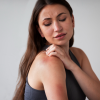
Do the benefits of sunscreen outweigh the dangers? Safe sun exposure allows our bodies to create Vitamin D, a nutrient crucial to our health in many ways. Studies show that many Americans are deficient in Vitamin D. Sunscreen blocks the UVB rays that cause your skin to produce this vital nutrient.
Additionally, most sunscreen contains a cocktail of chemicals with varying degrees of toxicity, according to many research studies. In order to use it properly, it must be slathered all over your skin, the largest organ of your body, and reapplied throughout the day. Your skin absorbs everything you put on it, so it’s just plain smart to evaluate the products you use.
Make Smart Sunscreen Choices
The Environmental Working Group (EWG) has identified a list of chemicals that consumers need to avoid, based on evidence that they may cause more harm than good. Oxybenzone, found in 80% of chemical sunscreens, has been found to cause allergic skin reactions and may mimic or disrupt hormones, which causes reproductive problems. It is also harmful to the environment. Legislators in Hawaii are attempting to ban the sale of oxybenzone-containing sunscreen. Based on its research, the EWG publishes a list of sunscreens that meet its safety criteria. Here is the EWG’s latest list of the best sunscreen for kids: Best Sunscreen for Kids
Where Experts Agree on Sunscreen
It can get a bit confusing and contentious (super-model Gisele was criticized for calling sunscreen “poison”) but even sunscreen detractors agree that allowing a sunburn is not healthy! So what is one to do?
Remember, experts agree that getting sunburned is not smart—excessive sun exposure can lead to skin cancer and skin damage, like wrinkles and other signs of aging. The advice most experts give is to:
- Allow your skin to be minimally exposed: research shows that the Vitamin D your body produces protects against cancer and other health issues
- Use a high-quality sunscreen when you’re exposed to the sun for long periods (like at an amusement park or if you work outside)
- Don’t be fooled by high SPF numbers: an SPF of 50 only protects you marginally better, but most people develop a false sense of security and risk overexposure
- The American Academy of Dermatology recommends SPF 30, which blocks 97% of harmful rays
- Eat fresh fruit and vegetables: they contain antioxidants that help your body fight the free radicals produced from sun exposure
- Wear loose clothing that covers you
- Wear a hat to shield your face: the skin on your face doesn’t produce a large quantity of Vitamin D and is more susceptible to showing the effects of overexposure to the sun (aging!)
Other resources:





